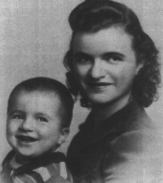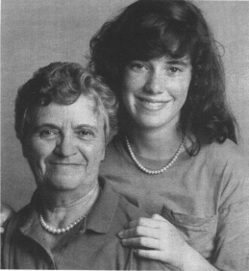




On a sunny Saturday afternoon I climbed the familiar narrow stairway at my Grandma's house. This trip was different than any I had made before; I was going to interview her. At first I was a little nervous, but soon I just relaxed and listened to the familiar voice of my Grandmother Katherine O'Grady.
In 1939 I lived in East Providence with my aunt. I had moved from Boston where I was originally from. I worked at Gibson's, a soda fountain at the bus stop on Westminster Street. I was very busy. Servicemen from all over used to come in. I mad $15 for a 48 hour week. I bought my own clothes, paid my own expenses, car-fare, whatever I wanted, and I'd go to the movies. If you had a five dollar bill then you were very wealthy.
I met my husband while I was working at Gibson's. He had a construction job building an air base up in Newfoundland. When Pearl Harbor broke out, he came back home and we got married. All the fellows had gone into the service. His brothers were all gone. All the men were leaving. My husband had a deferment because his job was considered important to the defense, and we had a nine month old son. But he wanted to go so badly that he quit the job. They turned his name into the draft board, and he went into the service very happily.
He was shipped out to Okinawa. He was a Seabee and worked in the construction battalion which builds bases. The Seabees would go ahead of the Marines to make the landing and do all that. He went from one island to the other across the Pacific.
What did you do in the war, Grandma?
After my husband went into the Seabee's I quit my job at Gibson's and went to work in a woolen mill, Lister's, which before the war was just a normal routine job. When the war started they need wool very badly so this was considered a service job. In other words, it was important.
At the mill the government used to send out all the Purple Heart soldiers to talk to us and tell us that we couldn't take time off, and pushed all this patriotism on us. One particular day I had the day off and they went to my house. I wasn't home. It would have been embarrassing to have soldier with a Purple Heart on asking why I wasn't at work.
What kind of work did you do at the mill?
Well, the wool would come in just like they sheer it off the sheep. It was dirty and they'd put it in like, they called it a carding machine, and it would be probably a hundred foot long. They took that and it would be in rolls and would go into a barrel, you know like you'd take cotton and push it into a crack. Those barrels would be brought to my aunt's machine and she would put it through, maybe eight or ten of those barrels. It would make a big ball and a roll almost like you'd have a ball of rope or twine. I think I go $27 a week, so it did pay more. The soldiers needed woolen blankets. At the time all servicemen were issued their clothing, their blanket, their bedroll, the whole bit. The blankets that came home after war had traveled all over the world.
The wool was all used for the defense; what they called a defense contract. If the factory fulfilled its contract and did good work it had an "E" for excellence. The mill had an "E" -- it was on a flag that would fly over the plant. We were very proud of it, because it meant that we were doing our part.
Who took care of your baby while you were at work?
I had a young baby and I had a place to leave him in a nursery. At the mill I worked every day and I had all my evenings off, and Saturdays and Sundays, so that I was home alone with my son. I used to take him to Bristol on the trolley and we'd have picnics on the beach.
I was lucky in that there was a Salvation Army day nursery on the street I lived on. They only charged $3 a week. After I moved to my own little apartment in East Providence, I used to have to take my son on the trolley car, bring him over to the nursery, and leave him there, and go back down the street and get on another trolley and get to work, and the same thing at night.
If he was sick I either had to stay home with him or take him up to my sister's; maybe his grandmother would take care of him. One time he had scarlet fever, and the doctor put him in the hospital. The doctor figured where I was all by myself and my husband was in the service, it would have been too much to be at home with him. This way I could come and go to work.
Was there a shortage of food?
Beef was very short. People ate a lot of chicken, and if you could get fish, eggs. Spam was a basic commodity. Everybody ate it. I remember a place downtown that sold horse meat (See Ration). My sister and I decided we would try it so we bought a couple of pounds of hamburg and a couple of steaks. We cooked the steaks for our husbands and all the while we couldn't eat them because we knew what it was, but the men thought it was great!
Did you follow the course of the war?
Oh, yes! We would listen to the radio at night and they would tell you. One particular Sunday night the Germans sunk the Wales and the Repulse which were British ships. When you're listening to it on the radio, it was like it was actually happening. It's very profound to think this is actually happening somewhere in the world and you're sitting safe in your house. There was one particular program which made a big impression on me about a woman called the "Beast of Belsen," her name was Elsa Koch. I never forgot that name. She used to make lamp shades out of human skin.
How did you keep in touch with your husband?
They had what you call a V-mail letter. It went through like a micro-dot, micro-film I guess it was. You wrote these letters and they went through a computer and when your husband opened it, it was like an envelope and a sheet of paper, and if anything was said that wasn't right it was just blocked out. I did get a few letter with the pieces cut out. If there was anything very interesting or important in the back of it that went too, and you couldn't just use one side of the paper because it was a premium, especially for the men overseas.
What was it like when you heard the war had ended?
They had a big victory parade in East Providence. I allowed my son to go with all his friends and they marched in it, and he was just a toddler. At that time we were all so naive, not only young people, even adults, grandparents, the whole world was naive, until after the war.
Do you think the war changed you?
After the war things changed because women found out they could go out and they could survive. They could really do it on their own. That's where I think women's lib really started. So the whole world has changed.
Everybody's more aware of everything. We were very sheltered up until 1941.
I think it made us more aware. It made me mature. When my husband went in the service, I often used to think if anything happened to him, our baby was my complete responsibility. At 21 that was quite an awesome thing to think that you had a small human life that you were responsible for.
Copyright 1995